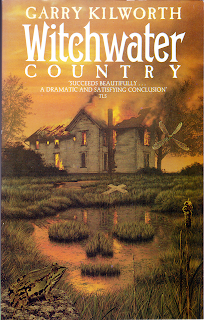An easy book to read but a hard one to assess, Garry Kilworth's WITCHWATER COUNTRY (1986) deserves a long review that I cannot provide, because even though several days have gone by since I finished it, the book whispers to me within my skull. In its many details, it offers a paradox.
For one thing, the book is written with utter simplicity and clarity, with a narrative so straightforward that a child could read it, yet at the same time, the story is about the perplexity of not knowing: of not knowing your family secrets, of not knowing your own parents, of not knowing your place in a shifting hierarchy of childhood friends.
The story is also about not knowing what might come next. The book seems unplotted: as in life, things happen, often out of the blue, yet the book is also structured with a series of set-ups and pay-offs that make the unexpected events feel inevitable after they occur. Halfway through the book, I knew that something terrible would happen, and then it did, but not in ways I could have anticpated. Nor could I have anticipated the chapters that followed, in which anxiety gave way to a looming sadness.
Not knowing what might come next leads to the challenge of dealing with what does happen, and for the story's young protagonist, coping is frustrated by his inability to process fears and complexities as an adult could. Halfway through the story, abruptly and without warning, someone dies; an adult would confront grief and shocked surprise head-on, but the child protagonist has no understanding of how to do this, and so he falls back on childhood fears, on the dread of ghosts and witches. Later, his true feelings erupt in ways that are unexpected but all-too believable.
In WITCHWATER COUNTRY, childhood is a time of not knowing, and the setting of the story matches the shifting, uncertain moods of the protagonist. The firm landscape gives way to tides that come and go; droughts give way to floods; rainstorms give way to fire. The setting changes constantly while never quite changing at all, and matches perfectly the fears and doubts of the hero.
If that sounds abstract, the story is not: as in the best writing by Kilworth, the book thrives on physical detail, on the moods and colours, fragrances and textures of a place and its history. You can walk through this book to see it and feel it, but Kilworth never holds your hand, never explains more than he has to. In the simplest of ways, he has written a complicated book, and the result is unsettling, uncertain, as vivid as a dream and as baffling as life.


No comments:
Post a Comment